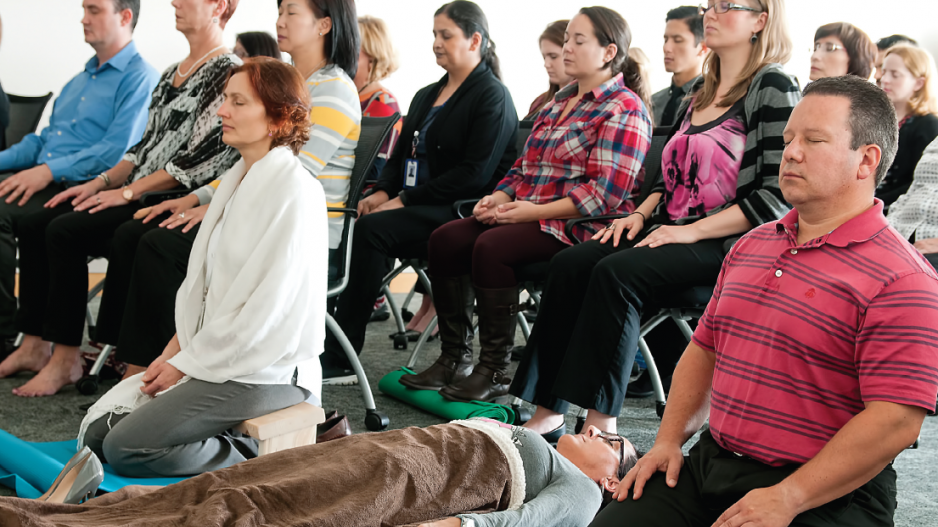A regular meditation practice offers numerous health benefits for individuals, but extending the practice to the office through workplace meditation programs can also benefit organizations.
Wendy Quan, change manager at Pacific Blue Cross (PBC), also works as a meditation instructor and helps other businesses and organizations set up their own meditation programs.
Quan discovered the benefits of mindfulness meditation when she adopted the practice to help her recover following a cancer diagnosis.
She began leading weekly beginner meditation classes at PBC in 2011 after friends and co-workers asked her to share what she had discovered.
Mindfulness meditation involves relaxing and focusing on breathing while developing positive attitudes to encourage a healthy, balanced mental state. This type of meditation helps practitioners cultivate self-awareness through compassion for themselves and others.
Last year, Quan added change management techniques to her three-part workplace meditation program. Today, approximately 190 PBC employees are registered in the program.
Optional donations are collected and later distributed to cancer and holistic health organizations. She also trains participants on how to lead their own meditation classes.
“I teach people how to become facilitators so they can teach people and keep it going,” said Quan. “It’s our most successful health and wellness activity at PBC. It’s about increasing resiliency to change and stress reduction.”
According to feedback from participants, benefits of incorporating meditation into the workday include clarity of thought, improved decision-making, better interpersonal interactions, sharper focus and a calmer state of mind. Meditation is well known for reducing anxiety and depression, improving sleep and lowering blood pressure.
Quan introduced the meditation program at PBC during a time of major technological and organizational change that affected every department in the organization. She attributes reduced employee burnout and ability to work overtime hours to the benefits meditation brings.
A survey taken after the program reported 83% of respondents found meditation “moderately or significantly” helped them adjust during the transition.
“We were really stressed out for seven years and expected absenteeism and leaves of absence, but we didn’t see that,” Quan said. “People went through a very stressful time and were very calm and committed to the change. When people have high change resiliency, that directly translates to their ability to change in the organization.”
City of Vancouver employees were invited to participate in the meditation pilot project last year, which resulted in about 50 employees meditating during their lunch hours at various locations.
Eight employees volunteered to participate in facilitator training.
“We now have ongoing practice sessions at two of our worksites on a weekly basis,” said Kate Lekas, the City of Vancouver’s health enhancement co-ordinator.
When asked for feedback, employees reported reduced stress, higher resiliency and better focus leading to improved work performance.
“Someone said it’s an excellent tool to get through those tough days,” recalled Lekas.
Quan is scheduled to speak about her workplace meditation program at the University of California in Berkeley in November. •




